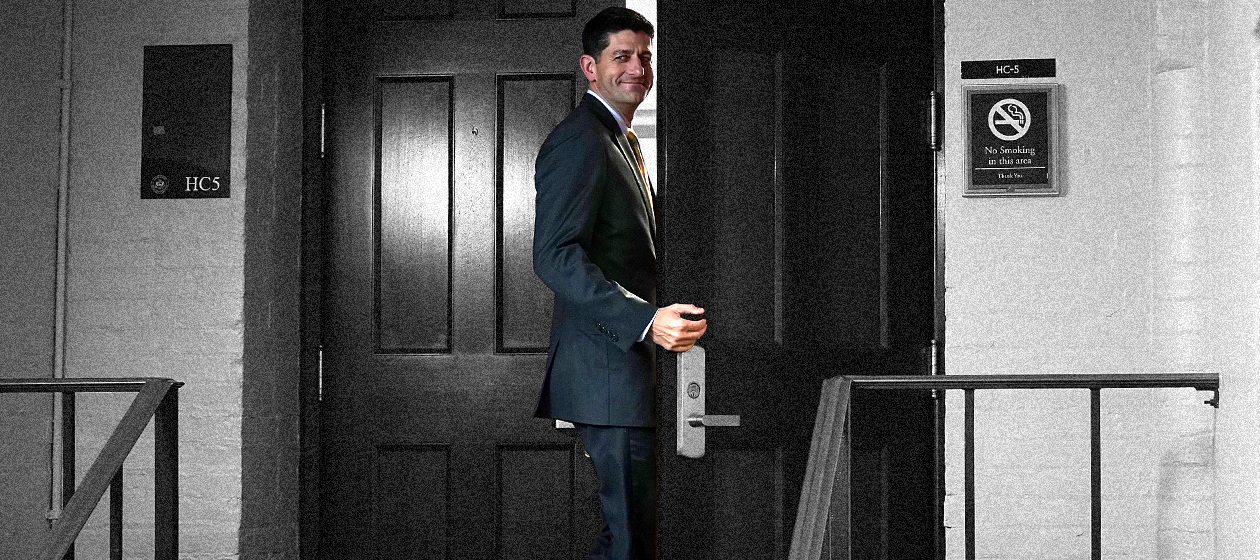Do Republicans really want to keep the House?
The low-energy party faces the midterms


A free daily email with the biggest news stories of the day – and the best features from TheWeek.com
You are now subscribed
Your newsletter sign-up was successful
Republicans appear very worried about the possibility of losing the House of Representatives this fall. For good reason.
The president's party losing the midterm elections is not exactly unheard of. This happens for a variety of reasons. President Trump's biggest problem is that he lost to Hillary Clinton in a number of suburban congressional districts currently represented by business-class Republicans. Spoiler alert: The Clintonite candidates running against them will do just as good a job taking care of these voters' stock portfolios as our old friend Rep. Blueblazer McEntrepreneurship.
Still, I can't help but wonder if the average GOP congressman really cares about the party winning as opposed to holding on to his or her own seat. Obviously most of them would rather control the House than not. There is every reason to believe that a Democratic majority in the lower chamber would vote to impeach Trump, even though without the Senate — which they have little chance of taking over — they cannot remove him from office. In fact, they might do this precisely because it would serve their purposes as a consequence-free gesture worth hundred of millions of dollars in free advertising. Imagine two years of every Democratic politician, talking head, and hanger-on mechanically repeating, "President Trump has been impeached."
The Week
Escape your echo chamber. Get the facts behind the news, plus analysis from multiple perspectives.

Sign up for The Week's Free Newsletters
From our morning news briefing to a weekly Good News Newsletter, get the best of The Week delivered directly to your inbox.
From our morning news briefing to a weekly Good News Newsletter, get the best of The Week delivered directly to your inbox.
But it's not clear to me that most Republicans want to keep the House for legislative reasons. Passing bills and that sort of thing? Meh. We already know how much they care about that.
I would challenge even the most enthusiastic political junkie to name a single piece of legislation — not including continuing spending resolutions — that Republicans have passed since the tax bill last December. For years under Barack Obama the GOP moaned that if only they could get the Senate and the White House they would "repeal and replace" the Affordable Care Act. They spent all of last summer attempting to do the latter and got nowhere. Ditto some kind of immigration bill. Since then they've hardly bothered.
No one cares what "Republicans" do or think. All attention is focused on the president. Weeks and months at a time go by without my even remembering that the legislative branch of the federal government exists. I cannot be the only one.
Why is this the case? I think the best answer is that Republicans have accepted inactivity because they understand they have nothing left to do. Absent the possibility of a supermajority in the Senate, they aren't going to get rid of ObamaCare. This is in part because they don't want to. It is probably the case that many Republican senators who felt comfortable voting to repeal it on multiple occasions when they knew the bills were going to fail would invent some excuse for not supporting similar legislation in the future. The reason for this is simple: Medicaid expansion and the provisions for Americans with pre-existing conditions are wildly popular, even in red and purple states. Voters have moved on from Obama-era talking points, and so have politicians.
A free daily email with the biggest news stories of the day – and the best features from TheWeek.com
Last December's tax-cut package represented the summit of Republican ambition — and exhausted it. If that sounds unfair, consider the fact that the outgoing speaker of the House said as much himself earlier this year. Making numbers go down on a piece of paper so that rich people get more money: What else does a typical Republican in Congress really care about? There are individual representatives and senators dedicated to pet causes such as criminal justice reform or, Lord help us, drug legalization, but they are a minority. Doing the occasional bipartisan press conference or Heritage Foundation policy panel seems to satisfy them.
Which helps to explain not only Republican inertia but the party's likely doom in November. You cannot run on something you did a year ago that has had almost no meaningful effect upon the life of the average voter. Some people will continue to pull the lever for Republicans because they operate under the illusion that doing so is their only means of demonstrating their opposition to abortion. Others will because they associate the Republican Party with the president, whose appeal among his base is as strong now as it was in 2016. If you are not a committed social conservative or a fan of Trump, what possible reason could you have for voting Republican?
This is a question that the party is going to have to answer sooner or later. Trump was the greatest, albeit the least expected gift, the GOP could have received in 2016. No other Republican candidate had a chance of winning Michigan or Pennsylvania in a general election. His special genius was and continues to be his ability to turn amorphous cultural issues that have seemingly little to do with public policy per se — dog-whistle concerns about "the flag," kitchen-table griping about political correctness, vague feelings of resentment — into grounds for supporting him and by extension his party. In the good old days when Paul Ryan and Co. were coming up, Republicans spoke about these things mainly in code: "entrepreneurship," "hard work," "opportunity," "handouts," "paying your fair share." Their version worked against Democrats, but not against President Obama, and there is good reason to think it will never win them another election. Can they replicate Trump's? Somehow it is difficult to imagine Sen. Mike Lee (R-Utah) taking to Twitter to berate professional athletes by name.
Until Republicans decide what they are going to pretend to believe in next, even they won't be able to say why they want to be in office.
Matthew Walther is a national correspondent at The Week. His work has also appeared in First Things, The Spectator of London, The Catholic Herald, National Review, and other publications. He is currently writing a biography of the Rev. Montague Summers. He is also a Robert Novak Journalism Fellow.
-
 Why the Gorton and Denton by-election is a ‘Frankenstein’s monster’
Why the Gorton and Denton by-election is a ‘Frankenstein’s monster’Talking Point Reform and the Greens have the Labour seat in their sights, but the constituency’s complex demographics make messaging tricky
-
 Minnesota's legal system buckles under Trump's ICE surge
Minnesota's legal system buckles under Trump's ICE surgeIN THE SPOTLIGHT Mass arrests and chaotic administration have pushed Twin Cities courts to the brink as lawyers and judges alike struggle to keep pace with ICE’s activity
-
 Big-time money squabbles: the conflict over California’s proposed billionaire tax
Big-time money squabbles: the conflict over California’s proposed billionaire taxTalking Points Californians worth more than $1.1 billion would pay a one-time 5% tax
-
 Is Alex Pretti shooting a turning point for Trump?
Is Alex Pretti shooting a turning point for Trump?Today’s Big Question Death of nurse at the hands of Ice officers could be ‘crucial’ moment for America
-
 Halligan quits US attorney role amid court pressure
Halligan quits US attorney role amid court pressureSpeed Read Halligan’s position had already been considered vacant by at least one judge
-
 House approves ACA credits in rebuke to GOP leaders
House approves ACA credits in rebuke to GOP leadersSpeed Read Seventeen GOP lawmakers joined all Democrats in the vote
-
 The billionaires’ wealth tax: a catastrophe for California?
The billionaires’ wealth tax: a catastrophe for California?Talking Point Peter Thiel and Larry Page preparing to change state residency
-
 Vance’s ‘next move will reveal whether the conservative movement can move past Trump’
Vance’s ‘next move will reveal whether the conservative movement can move past Trump’Instant Opinion Opinion, comment and editorials of the day
-
 Bari Weiss’ ‘60 Minutes’ scandal is about more than one report
Bari Weiss’ ‘60 Minutes’ scandal is about more than one reportIN THE SPOTLIGHT By blocking an approved segment on a controversial prison holding US deportees in El Salvador, the editor-in-chief of CBS News has become the main story
-
 The MAGA civil war takes center stage at the Turning Point USA conference
The MAGA civil war takes center stage at the Turning Point USA conferenceIN THE SPOTLIGHT ‘Americafest 2025’ was a who’s who of right-wing heavyweights eager to settle scores and lay claim to the future of MAGA
-
 House GOP revolt forces vote on ACA subsidies
House GOP revolt forces vote on ACA subsidiesSpeed Read The new health care bill would lower some costs but not extend expiring Affordable Care Act subsidies
